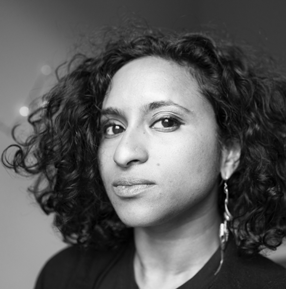Copyright © 2017 by Tarfia Faizullah. Originally published in Poem-a-Day on September 28, 2017, by the Academy of American Poets.
“‘Dhuniya dhari kochu pathar paani’ translates loosely to ‘individual life is water gathered in an upturned taro leaf.’ According to my father, the kochu leaf is oily and slimy, which means the water cannot and will not stick to its surface. If there is even a slight wind, the water will fall or disappear. I love this idea of life as an element in constant movement, free fall, or temporary respite in the shelter of a leaf. In this poem, water is also the life force that helps a potato grow in adverse conditions, a beverage offered by a daughter who loves her father, and the river road that leads a curious young man and his brother away from a brutal and bloody war toward the strange and glistening potential of a freer life elsewhere.”
—Tarfia Faizullah

